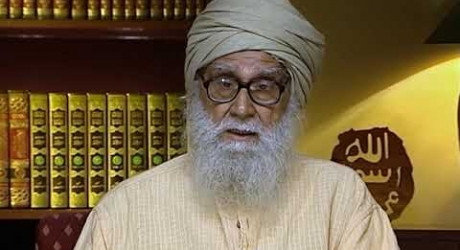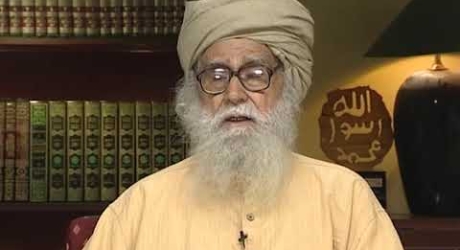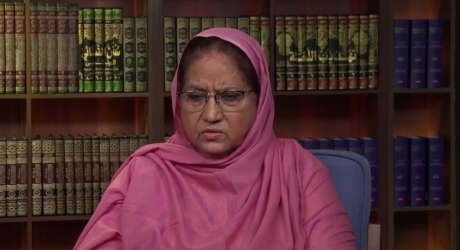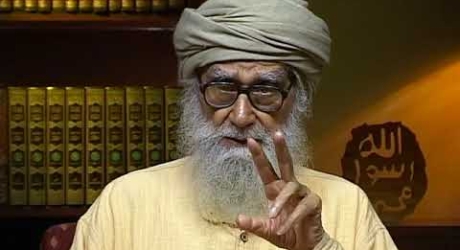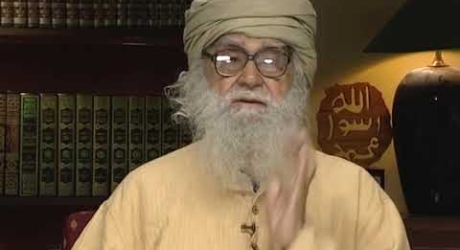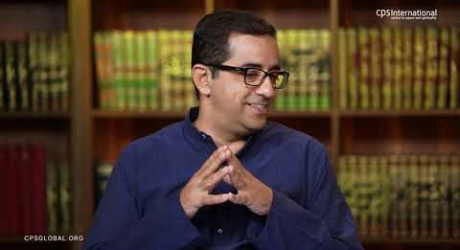The sacrifice of an animal on the occasion of Eid al-Adha every year has a significant bearing on human life. It symbolizes the moulding and making of a pure life. Today, however, this sacrifice has become an annual ritual. It remains alive only as a soulless religious tradition, as something to be done as a ritual on a particular day. It seems to have no impact whatsoever on people’s lives. However, if the sacrifice were made in its true spirit, our entire society would have been very different. Sacrifice is not the end but the beginning of real action. Sometimes, a seemingly small thing turns into something of great significance. What may appear small may symbolize something of enormous importance. So is it with sacrifice on the day of Eid al-Adha? On the face of it, the sacrifice involves offering an ordinary animal in the name of God. However, it symbolises something great rather than an occasional, spiritless and meaningless custom. By sacrificing an animal on this day, we symbolize our determination to sacrifice everything, including even our lives, for a higher purpose. God has made this world so that he who effaces himself alone is crowned with success. The sacrifice of an animal on the day of Eid al-Adha is an annual event that reminds us of this divine law. It is not something that has no connection with mainstream life. Sacrifice is, in fact, a universal law.
Introduction
As per the lunar calendar, this is year 1432 Hijri and tomorrow is Eid-ul-Azha. The literal meaning of Eid-ul-Azha is the Eid of sacrifice. It is celebrated every year by Muslims worldwide.
Eid-ul-Azha is comparable to a mini Hajj. Hajj (or pilgrimage) is performed at Mecca every year in the month Dhū al-Hijja; it is a universal worship. By discharging some acts in this month, believers become a part of the main Hajj to derive from it the benefits of pilgrimage.
Importance of Eid-ul-Azha
On account of spirit, Eid-ul-Azha is just as important as Hajj. The acts discharged on this day may be comparable to a mini Hajj. For example on the day of Eid, when a believer sets out to pray, he says, Lab baek, allah humma Lab baek (Oh God! am present, Oh God! am present). This is not a slogan or an act of lip service. It marks the revival of the pledge between God and a believer; the pledge that his life will be God-oriented and his struggle and strife will be for God Alone.
In this world, every person has many relations and numerous material involvements. Since childhood, man gets conditioned in these involvements and gradually they become the focus of his existence. But a true believer is one whose sole concern is God. The above prayer is an acknowledgement of this fact.
Degeneration sets in religion
Degeneration sets in the later generations of every religion and same has been the case with later-day Muslims. Degeneration is when spirit ceases to exist and only form remains. This has been the biggest weakness of man. Earlier when polytheism was dominant in the world - sun, moon and stars were worshipped and their Creator was reduced to a ritualistic being. In other words, Creator was forgotten and creations were worshipped.
In modern times, scientists introduced this phenomenon in the academic world as well. Galileo (d. 1642 A.D.) is said to have laid the foundations of modern science. From the religious standpoint, he did a very serious thing. He separated the measurable from non-measurable and segregated the qualitative aspect of things from its quantitative aspect.
A course thus began whereby science only investigated form and not the spirit. The meaning in nature could therefore not become a subject of science. Here also, science took the creations and left the Creator. For example, our Solar System is located in the outer reaches of the Milky Way Galaxy. This Galaxy contains roughly 200 billion stars. Had the Solar System been situated in the middle, it would have melted away but the Creator located it in outer reaches so that we get normal heat. Scientists do find out the number of planets in the solar system, its movement and location but this aspect of their being such immense meaning and design in the working of the Universe is not a subject of science. Science therefore investigates the form but the wisdom and meaning, which resides within is not its subject. This is the biggest evil of secular and religious way of working.
Beginning of Eid-ul-Azha
The day of Eid must begin with the pledge that – God is our sole concern and we will adopt a God-oriented life. But this does not happen. When people go to offer their prayers, they remain engrossed in their children and this is how the day passes by.
Usually, people go to a mosque nearby and pray but this is not the correct way. It is prescribed that all Muslims of a locality may gather at a place to pray. Doing so is like giving the proof of unity before God and remembering the Day of Judgement. It becomes a local replica of the Arafat valley, at the time of Hajj.
Prayer
During the prayer, Allah o Akbar is said again and again. It means that God is Great. But accepting God is Great entails the acknowledgement that I am not great. This means that prayer teaches modesty and patience. It is a revolutionary idea! Modesty is the opposite of ego. All evils in social life are –directly or indirectly – a by-product of ego. Prayer seeks to make man ego-less. If this spirit of prayer is inculcated in man, it will address the root cause of social evil in man.
But prayer has been reduced to being a set of rituals. People repeat the form and think they have completed their prayer. According to a Hadith tradition,
Offer prayers, the way you see me do (Muslim)
[Namaz us tarah padho, jis tarah tum mujh ko namaz padhte hue dekhte ho]
The prayer of Prophet was not form alone; it was filled with Rabbani spirit. Believers are asked to pray like Prophet Muhammad used to – in both form and spirit. If you only take form leaving behind the spirit, it will be non-adherence to the above Hadith.
Today, a lot of focus is laid on the form of the prayer. According to another Hadith
In later times, mosques will be filled with people (who read namaz) but will be bereft of guidance (Baihaqi)
[Ek zamana aayega jab masjidein bhari hongi par woh hidayat se khali hongi]
The above Hadith means that there will be a splurge of form-based namaz but spirit will cease to exist. This segregation is similar to what happened in science and is the cause of great deprivation. The division in science could lead man only to creation but not His Creator.
According to a Hadith,
He, whose namaz lacks spirit has not read the namaz (Kanzul Ummal)
[Uski namaz, namaz nahin jis ki namaz mein khushu na ho]
If you judge your namaz by what the Prophet said, you will be nowhere. Before the Eid namaz begins, Khutbah is discharged. Khutbah is a spiritual guidance given by the imam [one who leads the prayer] to believers whereby he seeks to acquaint them with what is expected of the believers in the contemporary world. Unfortunately, these days, imams do fiery political speeches in the khutbah. This is a wrong practice because discussing political or community problems is not the purpose of Khutbah. Khutbah is meant to inculcate the spirit of religion and arouse God-oriented thinking in the believers
Sacrifice
The act that follows the prayer is the sacrifice of an animal. This is an act of immense significance and has a great reward. What does it mean? That you buy a sacrificial animal, sacrifice it and eat its flesh. No; Not at all. According to Hadith, when Prophet was asked, “What is this sacrifice, O Prophet!” Prophet replied, “The way of your father, Abraham [Tumhare baap, Ibrahim ka tareqa]”
Now, the question arises that what was the way of Prophet Abraham. It is known that Prophet Abraham saw a dream that he is sacrificing his son, Prophet Ismael. He took his son and lay him down on the sacrificing stone.
Then, a voice called out and said to Prophet Abraham, “You accomplished your dream [tumne apna khaab poora kar diya]” Then he was asked to sacrifice a lamb. He sacrificed an ordinary goat (it is falsely believed that the goat was sent from paradise) and inhabited his son in the desertlands of Mecca. The latter was the sacrifice meant for his son because in those days, Mecca was totally uninhabited. Living in desert was a severe hardship. Symbolically, Prophet Abraham gave the sacrifice of goat and practically dwelled his son in desert. But today’s Muslims only sacrifice goat and do not inhabit their sons in desert. The tradition of Abraham will be fulfilled only when both aspects are fully discharged.
The tradition of Abraham was not to purchase a goat and sacrifice it; it was only symbolic. The real sacrifice was that of Prophet Abraham’s son. Our sacrifice has no value because we parted it into two – took one part and left the other.
Prophet Abraham was born in Ur, a city situated in Iraq, which was excavated from beneath the land in year 1922. Situated at some distance from Baghdad, this ruined city is now a tourist spot.
When Prophet Abraham preached, this city was much civilised and developed. Even then, not a single person responded to his call. God then inspired Prophet Abraham with another dawah plan. Earlier he addressed a crowd, but was later asked to cast his efforts on individuals. For this, a place was required which would be free from conditioning. Inhabiting his son in desert was actually the beginning of this dawah training. The first teacher of Prophet Ismael was Hajra.
When Prophet Ismael grew up, he married. Prophet Abraham did not live there and used to visit occasionally. Once when Abraham visited, Ismail was not at home but his wife was. She did not know who Abraham was. When he asked her about how they were managing, she started complaining about how difficult life was and how poor they were. Abraham told her to give her husband greetings from him and to tell him to change the threshold of the gate to his house When Ismail returned, his wife told him what had happened and what Abraham had said to her. Ismail told her that the stranger was his father, and that he had advised Ismail to divorce her because she would not be able to become a part of the divine training plan.
Sometime after Ismail had taken another wife, his father Prophet Abraham again came visiting and again found no one but the wife at home. However, this time when he asked her how they were doing, she cheerfully answered that they were prospering and she gave thanks to God for His blessings. Though nothing had changed in the environment per se, she could still maintain her positivity. When he left, he told her to give his regards to her husband and to tell him to keep the threshold of his gate. When Ismail returned, she told him all about the man and the piece of advice he had given in his message to Ismail. From this message Ismail knew that his father approved of the new wife and had advised Ismail to keep her with him because she was in consonance with the divine scheme of things.
It was a training atmosphere – Hajra trained Ismael, who then trained his wife and so on. The generation took many years to come to a sizeable number. Inhabiting them away from civilisation was a part of a divine plan and it was this generation from which emerged, the Prophet Muhammad and Companions. This was the real sacrifice.
Dawah Planning
From today’s point of view, the real sacrifice is to endure all pain that comes in way of doing dawah work. The sacrifice of an animal is symbolic; it is required that a believer may cast himself and his children and resources in the way of fulfilling the dawah plan.
After the sacrifice, people visit each other and eat together. This is a symbolic act as well, intended to foster togetherness and well-wishing amongst all but it has been reduced to being a mere ritual, which is bereft of spirit. That is why instead of unity and well-wishing, violence and spirit of ill-wishing exist in all Muslim countries.
Eid ul Azha is therefore not to repeat some rituals but to relive the religion of spirit. It seeks training people to adopt God-oriented life so that they are ready to offer themselves for the cause of God; prayers seek inculcating modesty by killing ego and arrogance so that they become patient and peaceful members of society. But we see that the present-day Muslims get emotional on trivial issues. All this is because real meaning of worship is amiss and only its form remains. Sacrificing an animal is to set example for dedicating oneself for the cause of God. Sacrificing the animal without dedication will not lead to any reward. Similarly, meeting one another should inculcate well wishing and foster unity. The ultimate lesson here is planning for dawah work.
Essence of dawah work
The essence of Hajj is planning for dawah work. According to a verse in the Quran,
Why, then, does not a party from every group come in order to acquire a deeper knowledge of religion and to warn their people, so that they can guard themselves against evil. (9:122)
During Hajj, individuals from across the globe gather at Mecca. If you read the final sermon of the Prophet, you will understand the spirit of Hajj, which is dawah work. Prophet Muhammad said,
God has sent me for the entire mankind. All those who listen to me shall pass on my words to others and those to others again. (Bukhari)
This is the real meaning of Hajj - to inculcate dawah spirit and dawah planning. When people go for performing the Hajj and remember the traditions of Prophet Abraham, Prophet Muhammad and the companions – it inculcates a deep dawah spirit. The call that was raised by the Prophet Muhammad during his Final Sermon still resonates in the valley of Arafat. Aware of this background and imbued with the spirit, when a true believer reaches Arafat, he is still able to listen to the words of the Prophet - the voice which is imploring him to spread the message of God to all mankind.
All Prophets came to the world to make man aware of the Creation Plan of God. We cannot know on our own, what our Creator seeks from us. To address this question, God sent his Prophets through times, the last of which was Prophet Muhammad. It is this message of Prophets which is the essence of Hajj and Eid ul Azha.
We must re-discover because we have segregated the spirit from the form and made everything a ritual. So, we must discover the prayer that Prophet prayed, the sacrifice that Prophets and their companions made. The day of Eid ul Azha is only to re-discover these attributes. This is called Tajdeed-e-imaan (revival of religion). Eid and Hajj therefore become a yearly revival, where we remember the entire history.
When the Quran was revealed, printing press did not exist. People used to memorise and recite (called mukris). This led to propagation of Islam in Medina. Now printing press exists and spreading it is therefore much easy. To make Quran understandable, it is important that Quran is translated in the language that people understand. For example, English is an international language that is understood by majority, today.
The dawah aspect of Hajj and Eid is its real aspect. Sacrifice and other acts are to remind us of dawah work and prepare us for it. Prophet Muhammad performed Hajj only once and the gist of his final sermon was dawah work. That before man dies, he must become aware of what the Creation Plan of God is so that he cannot say, he knew not. Otherwise, people vile away their short life span in material attainments because they remain unaware that paradise is after death only.
This is the mission passed on by the Prophet to his believers and is the essence of Hajj. May God guide us!
Question – Answers
Question 1: According to a tradition in Sahih Muslim, to fast on Arafaa gets man pardoned. What does this mean?
Answer: It is not merely the day which miraculously leads to a reward. The condition for fasting is gratefulness and piety. A fast which has this spirit would be rewarded.
Question 2: Please explain the message in the following verse in the Quran,
„My prayer and my sacrifice and my life and my death are all for God, the Lord of the worlds. (6:162)
Answer: The message is that the focus of our lives should be God. Every person has an aim in life, which becomes the driving force. Islam wants to inculcate that spirit in man that he makes God-oriented religion as the focus of his life.
Question 3: What does Quran say about human beings? Are they governed by law of nature or are they free? In later case, we cannot explain them and in case of former, how can we explain them?
Answer: Quran presents nature as a role model. Nature is governed by divine law and does not have the freedom of choice. Whereas man has freedom of choice and it is expected that just as rest of the world follows the divine law (albeit under compulsion), man of his own free accord must follow the same course of peaceful working. Stars for instance, revolve within their own orbits and do not collide with one another. The same is expected of man so that he stays within his realms and does not enter the realm of others. This has been explained by the following Hadith
A believer is like a tethered horse that does not go beyond the limit of the tether (Miskat)
Man therefore should tie himself in a divine tether and must not transgress beyond it. For example, man has the freedom to speak but not to abuse; he can do business but not exploit.
Nature in entirety is a model. For example, rose plant has a thorn and flower. The flower avoids and does not confront the thorn. Man is required to replicate this behaviour by choice. Cow for instance, eats grass and returns milk. Cow is a divine industry which converts non-milk into milk. So, you must live such that you convert negative experience into positive experience.
Question 3: Is man hundred percent free?
Answer: By way of his will, man is hundred percent free. There are two aspects to man’s existence in this world – his freedom and nature’s infrastructure. So far as nature’s infrastructure is concerned, man does not have an option; he will have to use oxygen to breathe, drink water to quench his thirst and eat food for sustenance. However, on account of freedom, he is free to use or misuse it as per his will; he can speak the truth or indulge in falsehood, can eat all by himself or share. Man’s existence therefore has a fifty percent compulsion (in terms of the infrastructure) and fifty percent freedom (on account of his free will).
Question 4: What was the special quality in the generation of Prophet Ismael?
Answer: The key difference between the generation of Prophet Ismael and the present-day man is that the former were free from all forms of conditioning. We live in a civilised world and as such are not able to save ourselves from conditioning. The generations of Prophet Ismael were born and brought up in desertlands and as such were free from conditioning. This was their special quality; they possessed no other special sagacity. If the present-day man is able to decondition himself, he too will become like them!
Question 5: In his Final Sermon, the Prophet said, the ones who will come later will understand the message better. What does this mean?
Answer: It does not mean that people who are a product of the later-day generations will necessarily understand the message better. It means that when the message is being disseminated there will be some who will be able to understand it better. It is not a matter of times but a matter of people per se.
Question 6: Can you please elaborate what you mean by “Hajj symbolises universal dawah work”?
Answer: Hajj is an act of global mobilisation; if the spirit of dawah work is alive in the minds of the believers, they will keep doing dawah work throughout the journey. People consider Hajj as a ritual; they do not understand that Hajj entails adoption of the Abraham style of life. Having adopted the form alone, they have become bereft of spirit.
Question 7: What kind of sacrifice is sought for dawah work in today‟s times?
Answer: The biggest sacrifice that a believer can offer in today’s times is to change his concern. Materialism is the sole concern of man today; a believer must seek fulfilment of need-based material requirements. It must be clearly understood that one aspect is mission and the other is need. Only need-based requirements should be met and rest of the time should be utilised for the mission.
Question 8: Why when other things can be eaten for sustenance, are animals killed and eaten?
Answer: This is not the correct perspective. These animals are a part of the food chain and as such this phenomenon should not be called as “killing.” Even if one does not eat non vegetarian food, it does not make one a vegetarian because microorganisms exist everywhere. Beliefs contrary to this were prevalent in the pre-scientific era, when there did not exist a microscope. Today, man is aware that this is the way Creator has designed this world. I am a vegetarian by birth but because the Creation Plan of Creator is such, one cannot escape from it.
Question 9: People are so materialistic that no one has time to talk about religion?
Answer: This has been told in the Quran that people rush towards that where they see an immediate gain.
Question 10: People meet only like-minded people and do not interact with others. How feasible is this approach for a dayee?
Answer: The general tendency is to mingle with like-minded people but this mindset leads to intellectual stagnation and is not feasible for a a dayee. A dayee is required to go to unlike-minded people. If you are afraid to go to people who have more knowledge than you, how will you do dawah work? When I was in Azamgarh, I used to meet three people, who were all English speaking even though I did not know English. I used to learn a lot from them. This is a very healthy practice for all.
Question 11: Does distribution of literature suffice for a missionary or should his focus also be training of individuals to inculcate a dawah mindset?
Answer: Distribution is important but you must select some people – who are seekers, and are sincere. As an individual you must work on them.
Question 12: Once you explained that God will grant throne of truth to those who speak truth. So, how should we save ourselves from hidden lies?
Answer: White lies are usually not spoken. But people get used to twisting facts and findings since childhood. This is done to avoid blame and maintain an image before people. People become conditioned to do so. Till you introspect and literally search and find your faults, you will remain addicted to twisting the facts. I used to stay aloof and separated from people so I got saved from this mindset; but mostly people lead social lives and become used to such behaviour.
Question 13: A person said he is proud to have a mission like Al Risala? Is such “pride” okay?
Answer: This is entirely wrong because pride demonstrates arrogance. People should only be grateful to God for showing the right path. This is the real character of a believer.
Question1 4: Once you said that man can be practical on other fronts but in his dealings with other men, he should be ideal. Please elaborate.
Answer: It must be understood that man can have a levy (rukhsat) only in matters pertaining to God and him. When dealing with fellowmen, one must lead a life of utmost honesty; there is no relaxation on this account. For instance, if you promise to return someone’s money in 10 days, you must do so. do not let 11th day pass. In all matters of dealing, strict caution should be taken.
Question 15: Companions gave a lot of importance to Surah Al Asr (Ch 105). Please explain
Answer: This Chapter seeks that a believer should be the mirror for another believer.
Question 16: What is the formula for leading a life of gratitude in this world of test?
Answer: You have to keep re-discovering the items of gratitude. For example, we are breathing but the process of inhaling oxygen is noise-free! We will have to discover that it is such a blessing of God that without us discharging a payment, oxygen supply continues. He who discovers these items again and again will be filled with the feeling of gratitude.





